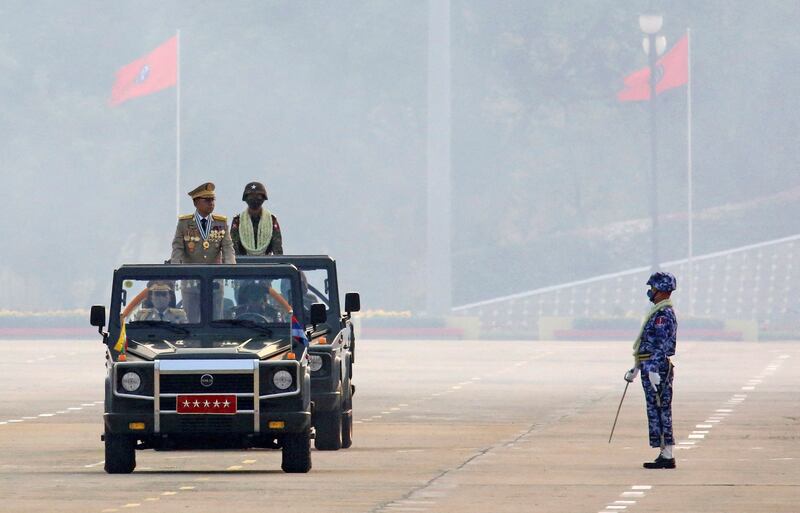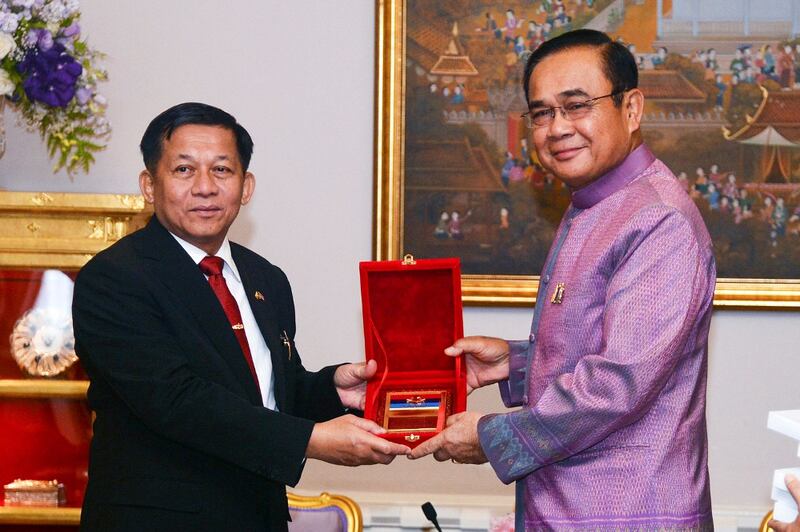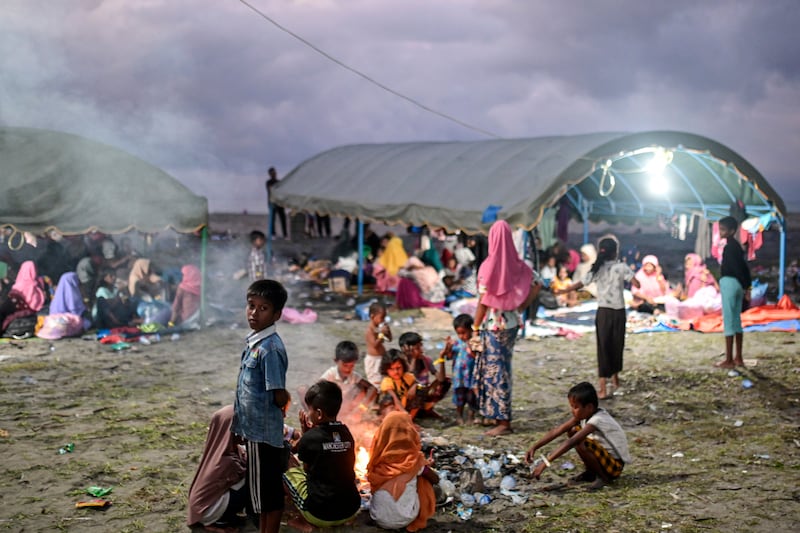Three years after Myanmar’s military seized power from the democratically elected National League for Democracy government, the strategic landscape looks fundamentally different.
The Burmese military has suffered significant setbacks across multiple fronts nationwide. The amount of territory under its effective control has dwindled, while the State Administration Council (SAC) – the official name for the junta – has run the economy into the ground.
The opposition National Unity Government (NUG) has laid out a federal democratic charter, the glue that has held together a coalition of various ethnic resistance organizations, with more band wagoning in the past three months.
The military is spread thin. It has severe shortages of manpower and is increasingly reliant on long-range artillery and airstrikes, which are enough to terrorize the population but not control territory.

There has been scapegoating within the senior officer corps, which has further dissipated morale and cohesion. On the eve of the coup’s third anniversary, the junta was forced to extend an emergency decree for another six months.
In short, the SAC is losing, and that has profound implications for Myanmar’s neighbors and partners in ASEAN – Thailand in particular, as well as the South Asian nation of Bangladesh, who both made a big bet on the junta’s consolidation of power.
Thailand
If any country supported the military takeover in Myanmar, it was Thailand, whose own military seized power in 2014.
The then-government of Prayuth Chan-o-cha saw itself as a template for how the generals in Naypyidaw could dismantle the opposition. Prayuth’s government achieved this through arrests and disqualification of leaders and the banning of political parties, while putting in place an electoral system that guaranteed military control through their political proxy.
More importantly, within the 10-nation ASEAN bloc, Thailand was the Burmese junta's staunchest diplomatic defender. Bangkok was willing to incur Jakarta's wrath when it organized the track 1.5 dialogue between the SAC and its neighbors – largely seen as an end run around ASEAN – in April 2023.
For decades, Thailand had been a safe haven for Myanmar refugees and exiled activists.
That’s no longer the case. Thailand has routinely violated the international legal norm of non-refoulement, by forcibly returning civilians and wounded opposition combatants to the SAC.

Thailand now has to confront the reality that much of its border with Myanmar is under the control of the armed Burmese opposition. Kayah state is almost entirely controlled by Karreni forces, and is the first state to establish a revolutionary government. Karen forces control much of the border, and even formally pro-SAC border guards forces have pledged neutrality in a bid to stay off opposition force attacks.
The Thai government offered no protest when Myanmar’s Air Force violated its airspace during an attack on ethnic resistance organizations in April 2022.
Thailand has restricted humanitarian corridors to the border region for fear that would encourage more refugees crossing into Thailand.
That is changing. Thai Foreign Minister Pranpree Bahiddhanukara recently visited the border town of Mae Sot where he pledged greater access. A checkpoint for aid was established under the ASEAN Coordinating Centre for Humanitarian Assistance.
While the situation in southern Shan state has been much more fluid, with pro-SAC forces largely in control, the United Wa State Army announced neutrality, while the Shan State Progressive Party just endorsed the NUG.
Many in the Thai royalist and military establishment seem determined to go down with the SAC.
On Jan. 30, a Thai Court ruled that the money laundering charges against a close associate of Senior Gen. Min Aung Hlaing – the Burmese coup leader and junta chief – were not proven. Businessman Tun Min Latt was freed from incarceration in September 2022.
Thai elites seem incapable of recognizing the changes on the ground. And the new government of Srettha Thaksin is unlikely to go against the interests of the royalist and military elites.
Bangladesh
To Myanmar’s west, the government of neighboring Bangladesh has been surprisingly supportive of the Burmese military government despite how the Tatmadaw’s ethnic cleansing campaign drove 740,000 Rohingya into Bangladesh in 2017.
At present more than 1 million Rohingya live in squalid refugee camps in Bangladesh, which is increasingly impatient to see them return home to Rakhine state in Myanmar.
Dhaka had hoped the junta would agree to the orderly return of the Rohingya in order to break out of its diplomatic isolation. Several bilateral meetings were held, but the Rohingya population has largely refused to return without the provision of full legal rights and the return of their property.
Since Nov. 13, 2023, the Arakan Army (AA) has swept across northern Rakhine and southern Chin States and now controls almost the entire border with Bangladesh.
The Buddhist-dominated AA has clashed with the Arakan Rohingya Solidarity Army (ARSA), which seems far more interested in consolidating their control over the refugee camps and eliminating political rivals.
While the AA has agreed in principle to the return of the Rohingya, they have been far less emphatic about their legal rights than the NUG.
The Bangladesh government participated in both Track 1.5 dialogues and made only a pro-forma protest when the Myanmar Air Force violated its airspace in September 2022, or when artillery shells landed across the border.
In January, Prime Minister Sheikh Hasina won re-election in highly flawed polls that were marred by violence, fraud, and an opposition boycott. Her government lacks domestic legitimacy and is unlikely to garner desperately needed international economic and humanitarian support, making the return of the Rohingya an even more pressing issue.
And with a new battlefield situation, we might see Dhaka harden its position on the SAC.
Malaysia, Indonesia, and the Philippines
Among ASEAN members, Malaysia, Indonesia, and the Philippines were the most critical of the Burmese military's takeover three years ago. They led the charge to prevent the SAC from participating in the bloc's ministerial meetings, after ASEAN repeatedly failed to implement the Five-Point Consensus reached in April 2021.
While Myanmar was allowed to attend ASEAN meetings at a non-political level, it refused to do so until January 2024.
In 2023, Indonesia used its year as ASEAN chair to engage in quiet diplomacy with all stakeholders but achieved little. ASEAN never recognized the NUG, nor was the NUG able to establish formal liaison offices anywhere in any ASEAN capital. The bloc continues to recognize the junta.
Malaysia and Indonesia have another interest: The repatriation of the Rohingya. Following the 2016-17 pogroms, both countries took in large numbers of refugees.

For Malaysia, it was supposed to be a win-win situation. Although Malaysia provided work permits to the refugees to address labor shortages in its palm oil plantations, most moved to the cities. The economic slowdown caused by the pandemic, led to scapegoating and a sharp decline in public support for the resettlement program.
Indonesia’s initial reception of the Rohingya was not government policy, but the action of Acehnese fishermen. More recently the Indonesian government has hardened its stance and blocked new arrivals.
In short, the junta’s recent losses should prompt some rethinking in Bangkok, Dhaka, Jakarta, and Putrajaya. The bet that Thailand and Bangladesh made on the junta is not paying off and it’s in all four governments’ interests to begin direct talks with the NUG.
Zachary Abuza is a professor at the National War College in Washington and an adjunct at Georgetown University. The views expressed here are his own and do not reflect the position of the U.S. Department of Defense, the National War College, Georgetown University or BenarNews.
